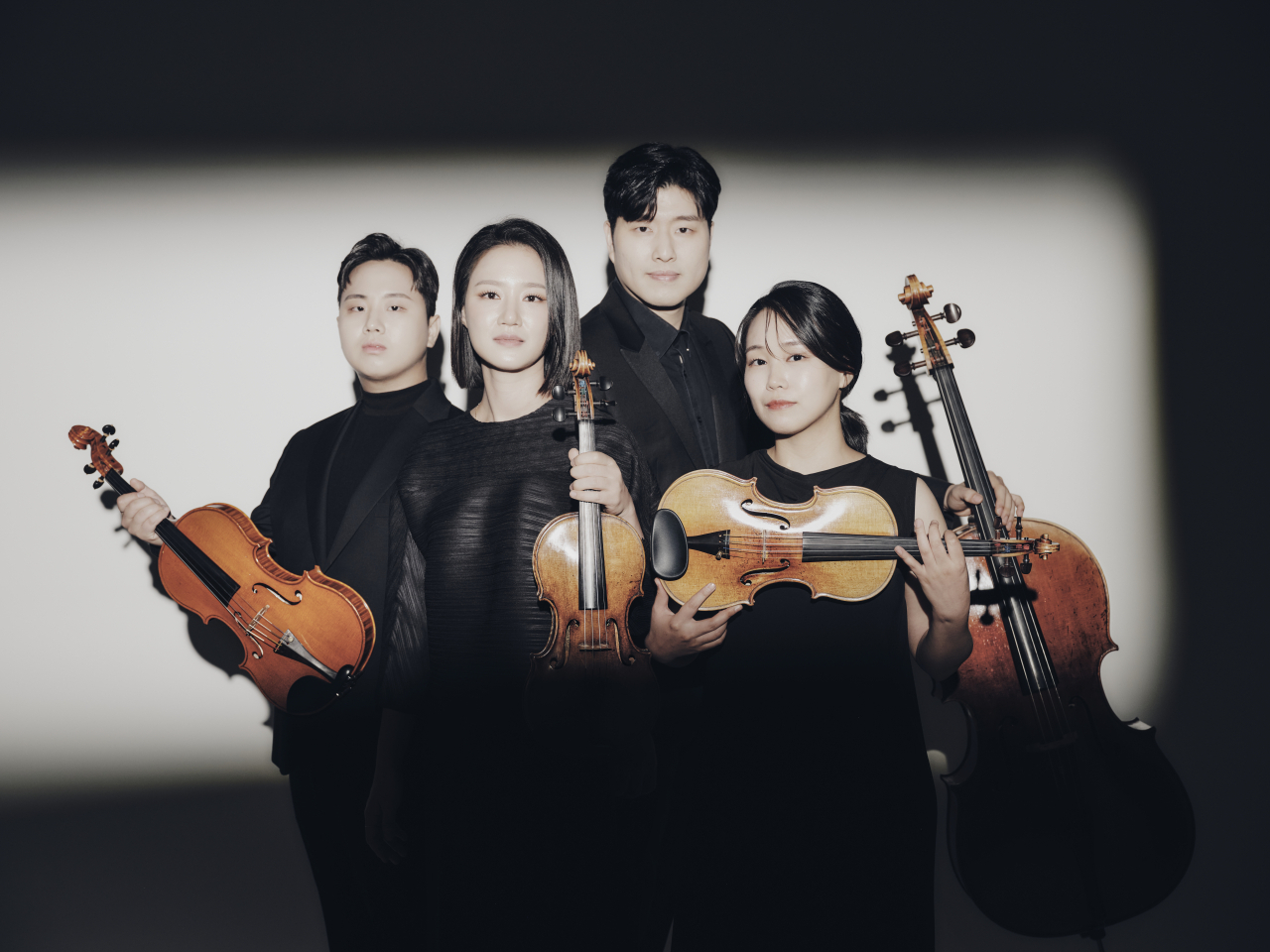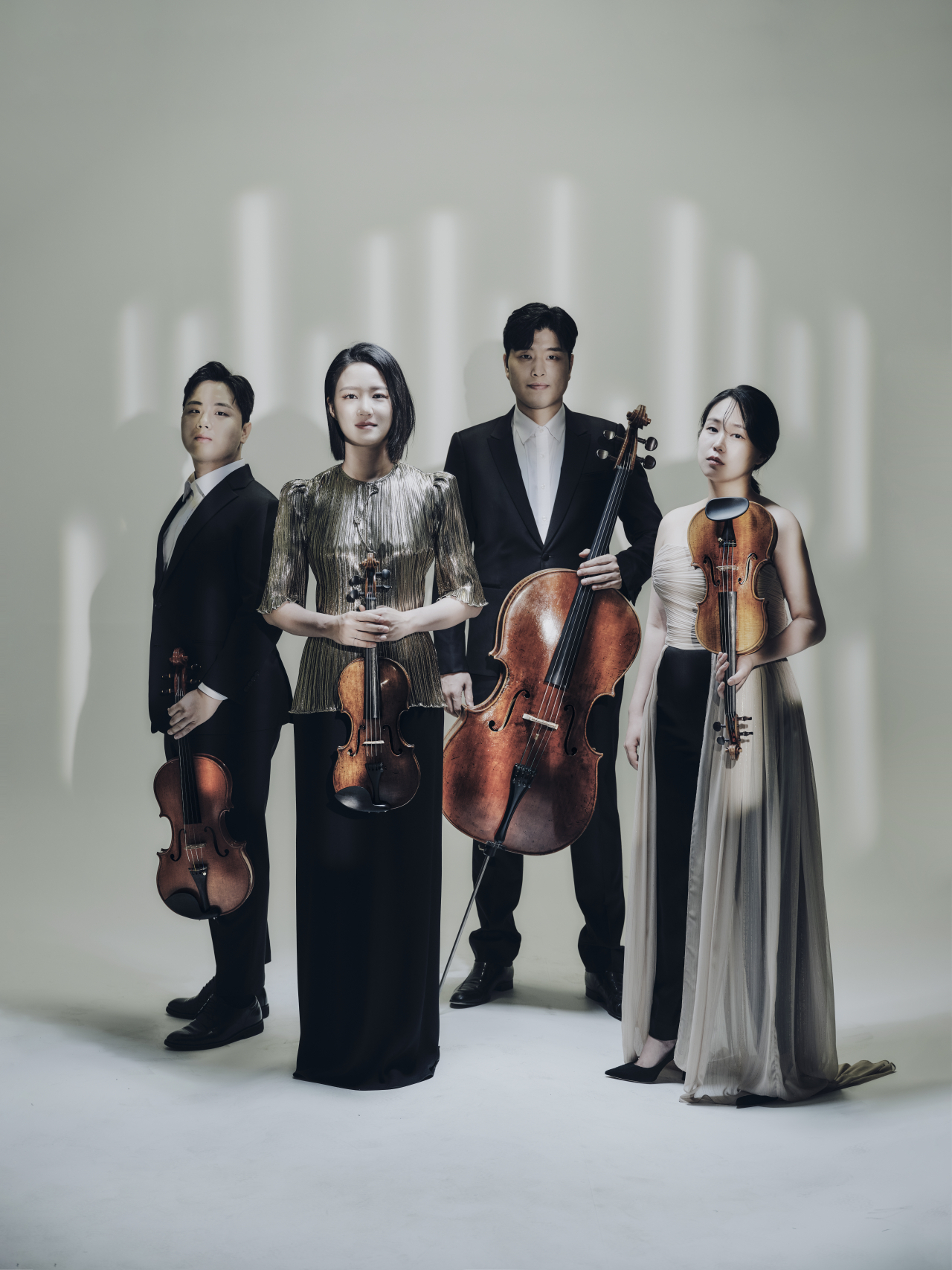 |
(Clockwise from bottom left) Abel Quartet members Youn Eun-sol (violin), Park Ha-moon (viola), Jo Hyoung-joon (cello) and Park Soo-hyun (violin) (MOC Production) |
The Abel Quartet, like many musicians around the world, faced a pivotal moment at the height of the COVID-19 pandemic. The members, who were based in Vienna, Austria, returned to their home country, South Korea, for a performance, only to find themselves unable to go back to Vienna due to the lockdown there. The quartet found itself in a unique position: the small ensemble was just the right size to take to the stage at a time when many orchestral performances were canceled and many quartets had disappeared. That led the quartet to move their base to Korea in January 2023, the group's 10th anniversary year.
The string quartet has had a remarkable journey over its 11-year history. Since winning second prize at the International August Everding Competition in 2014, it has garnered numerous accolades, including first prize at the 6th Joseph Haydn International Chamber Music Competition in Vienna in 2015 and second prize at the 11th Concours International de Musique de Chambre de Lyon. In 2016, Abel Quartet made history as the first Asian team to win at the Concours International D'execution Musicale de Geneve, securing third place.
The quartet has also undergone member changes. While founding members violinist Youn Eun-sol and cellist Jo Hyoung-joon have remained, violinist Park Soo-hyun joined in 2016, and violist Park Ha-moon -- at 26, the youngest member and about 10 years younger than the other members -- joined last year. At some point, Jo was away, serving in the military, and the two female members have become mothers.
To commemorate its 10th anniversary, the Abel Quartet released its debut album, "In nomine Domini," last year.
Despite the challenges and changes the members have faced, performing as a quartet remains an unwavering passion for them.
"Each of us plays our individual parts, but there's something truly captivating about the process of bringing those four distinct voices together to create one harmonious sound. I feel the thrill when all the preparation and the quality of our playing align perfectly," violist Park said.
That thrill is also what continues to drive the members forward.
“The thrill we feel when we create music among the four of us is something we cannot give up,” violinist Park shared.
“Many great composers wrote string quartets as some of their final works. I don’t know exactly why but I hope people come and find out why,” Youn said.
Many great composers turned to string quartets in their later years, producing some of the most revered works in the repertoire. A few examples include: Mozart’s String Quartet No. 23 in F major, K. 590, which was his last completed work; Beethoven’s String Quartet No. 16 in F major, Op. 135; Schubert’s final String Quartet No. 15 in G Major, D. 887; and Shostakovich's String Quartet No. 15 in E-flat minor, Op. 144.
For this year, the quartet will perform all of Mendelssohn’s string quartet works, including String Quartet No. 8 in F minor, Op. 80, which was his final major work.
After focusing on Haydn with performances and an album, the members discussed composers of the era after Haydn, the Romantic era. Among them, Mendelssohn has left a total of eight string quartets, while other composers like Schumann and Brahms each wrote three, Jo said, explaining the reason behind the group's decision to perform all Mendelssohn’s works at the upcoming two-day recital, taking place Friday and Sept. 14 at Seoul Arts Center.
As they prepare to perform Mendelssohn's complete string quartets, the members are discovering new aspects of the composer who lived through different musical eras.
"My perspective on Mendelssohn has changed. He had a position that traversed many musical eras,” violinist Park noted.
Mendelssohn was deeply influenced by Classical era composers like Mozart and Haydn, which is evident in his use of traditional forms and structures. At the same time, Mendelssohn incorporated Romantic elements such as chromaticism, expressive harmonies and a focus on nature and emotion, Park added.
“Some of Mendelssohn's string quartets are rarely performed, and there may be reasons for that. However, by presenting his complete string quartet works, we aim to give the audience an opportunity to experience the breadth of his life, from his early compositions at the age of 14 to his final works before his death,” cellist Jo said.
 |
(Clockwise from bottom left) Abel Quartet members Youn Eun-sol (violin), Park Ha-moon (viola), Jo Hyoung-joon (cello) and Park Soo-hyun (violin) (MOC Production) |







![[Today’s K-pop] Blackpink’s Jennie, Lisa invited to Coachella as solo acts](http://res.heraldm.com/phpwas/restmb_idxmake.php?idx=644&simg=/content/image/2024/11/21/20241121050099_0.jpg)